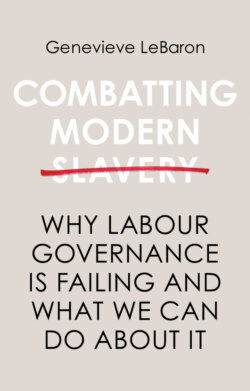Читать книгу Combatting Modern Slavery - Genevieve LeBaron - Страница 9
Why Global Labour Governance Is Failing
ОглавлениеWhy aren’t these governance efforts working? And what type of supply chain governance is needed to protect the world’s most vulnerable workers?
The answers, as this book will reveal, are complex and vary across different sectors, type of governance initiative, and parts of the world. But stepping back, it is clear that two mutually reinforcing problems stand in the way of improving labour standards in global supply chains: both the design and the implementation of contemporary labour governance are severely flawed and limited, in ways that benefit individuals and organizations profiting from exploitation, and fail to protect workers.
Most public and private initiatives to combat modern slavery and bolster labour standards in global supply chains are designed to omit the portions of supply chains in which the most severe forms of labour exploitation are known to thrive. Focused on the large ‘Tier 1’ suppliers (those that hold contracts directly with and take orders from brands and retailers), corporate and government programmes rarely address labour supply chains – the unregulated networks through which contingent and sometimes forced and trafficked workers are recruited, transported and supplied to businesses by third party labour agents – nor the ‘shadow factories’ (unregistered and undisclosed production sites that are used to meet orders on time and evade compliance) in which unauthorized production takes place. They tend to create loopholes around the most vulnerable workers within supply chains, rather than seeking to protect them. Indeed, in spite of the widespread recognition that severe exploitation is accelerating in the bottom tiers of supply chains, among labour subcontractors, in unauthorized factories, in the informal sector and in home-based work, recent labour governance initiatives tend to conceal and disclaim responsibility for these spaces and relations of exploitation rather than bring them to light.
In addition to their design flaws, the implementation of labour governance initiatives is similarly deficient. In recent years, most countries have scaled back public labour inspectorates and given businesses more authority to enforce private labour standards and laws. A booming private industry of accounting firms, social auditors and supply chain analysts has emerged to monitor and enforce labour standards, and verify conformance to CSR standards, often in collaboration with NGOs. Yet, while the enforcement industry has helped corporations to generate media- and consumer-friendly metrics and reports and bolster the credibility of their aspirational goals, it has led to very little concrete improvement in the detection, reporting and corrective action of severe labour exploitation.
These flaws, I will argue, are not coincidences. Rather, as civil society actors work to raise labour standards in the global economy, powerful business interests are fighting to preserve the status quo of a retail-driven economy that is heavily dependent on labour exploitation. Today’s corporations are hardwired to maximize profits for their shareholders and executives, to monopolize and to grow, and built into this wiring are enormous risks and dangers to workers. To preserve their profitable business models, corporations are leveraging strategic control over the design and implementation of public and private supply chain governance initiatives. And they are wielding power in governance arenas – from policy processes within national governments, to global forums and organizations like the ILO – to stave off restrictions on their production practices and increases in legal liability. In short, industry actors are speaking out of both sides of their mouths when it comes to labour governance. They are championing causes like safe workplaces and worker voice and initiatives to combat modern slavery even as they are, at the same time, quashing laws and conventions that would spur real and long-lasting change to labour practices in the global economy.
The overall result is that, by creating an illusion of effective governance and buy-in to incremental improvement, CSR is doing more to cover up labour problems in global supply chains than it is doing to fix them, or even bring them to light. No doubt, there are some cases where corporate initiatives have led to improvements for some workers with respect to some issues, like better health and safety standards. But, as this book will reveal, overall the trend is towards the legitimization and reinforcing of prevailing business models and endemic exploitation. The issues that matter most in terms of protecting workers and improving their conditions – wages, forced overtime, forced labour, collective action rights – are rarely altered by existing private governance programmes. In short, efforts and initiatives to govern global labour standards are working to enhance corporate growth and profit, but are failing workers and civil society actors seeking to raise labour standards in the global economy.
